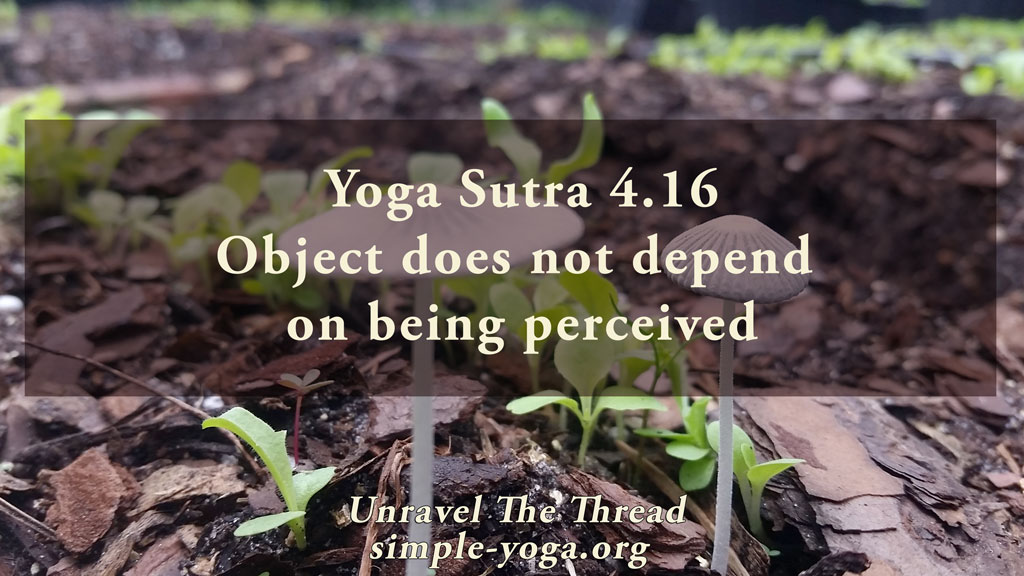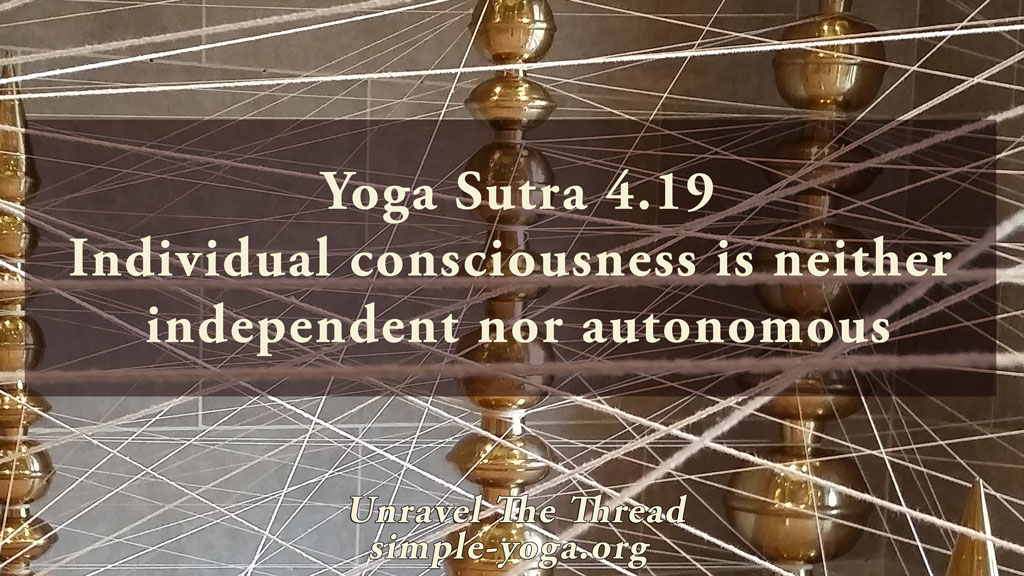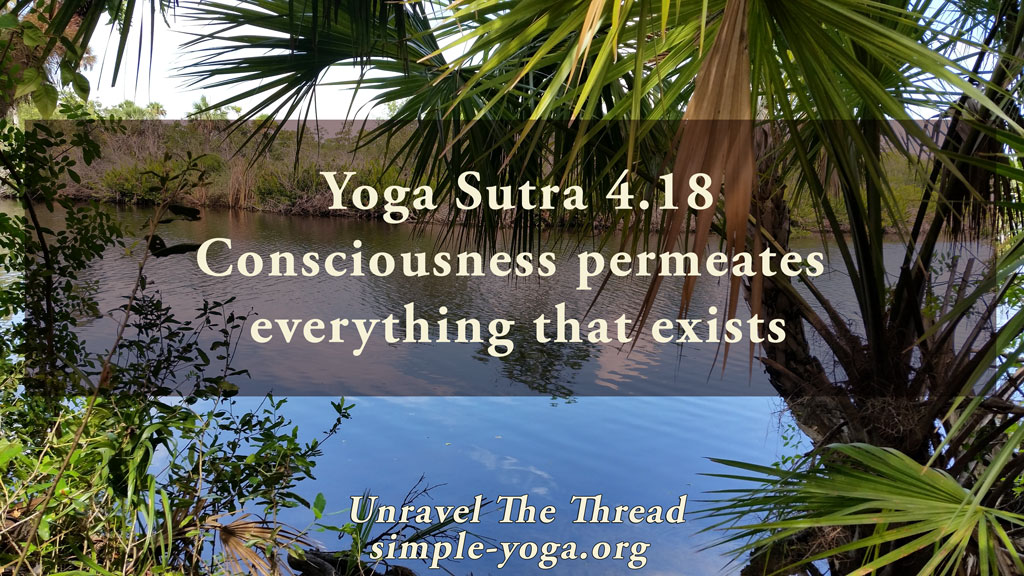
4.16 Object does not depend on being perceived
September 19, 2022
4.19 Individual consciousness is neither independent nor autonomous
October 10, 2022
4.16 Object does not depend on being perceived
September 19, 2022
4.19 Individual consciousness is neither independent nor autonomous
October 10, 20224.18 Consciousness permeates everything that exists

4.18 Unchanging, Consciousness is the substratum pervading all existence. Ways of being are always known to Consciousness.
After explaining in the previous aphorisms that the world is real and that ways of being influence perception of the world, in this and the next two sutras, Patañjali focuses on the relationship between consciousness and the world that can be experienced. Remember that this topic was explored already in sutras 2.17 to 2.23 where it says that suffering results from conflating awareness and experiences. When you identify with your passing experiences, you are bound to ride an emotional rollercoaster. Experiences offer you the opportunity to recognize the fundamental difference between unchanging consciousness and the world of change.
Consciousness is what is often called the seer, witness, source or the absolute (all words used to try to help our minds understand something that is beyond our minds.) Western philosophy has tried to understand and explain consciousness for centuries without reaching a conclusive resolution. In recent years, consciousness has emerged as a new field of scientific study including areas such as psychology, cognitive science, neuroscience, physics, mathematics, and philosophy. Contemporary science has tried to explain consciousness by formulating competing theories that still cannot explain adequately what it is that gives us the feeling of being alive. Perhaps no word or theory can ever encompass the complete sense of what it means to be alive. And even if it could, the pervasive aliveness throughout all of existence is certainly beyond the mind, so it cannot be fully apprehended by the mind. You certainly experience the sense of being alive as you are reading this, while at the same time you’re noticing the sensations in your body offering information about the space you are in, including temperature, humidity, noises and sounds, textures, scents and visual information. The aliveness in all of life does not change but our relationship to that aliveness does. This explains how some days you wake up feeling out of sorts and other days you wake up feeling energized.
We are using the word Consciousness as the aliveness or the life in everything that exists everywhere. In contrast, we are using the word awareness to refer to your individual sense of being alive. Sometimes you feel more alive, that is, more vibrant and with more vitality than at other times. The major theme in the Yoga Sutra is that you can connect to your natural state, a state when your aliveness flows harmoniously with the flow of life. When you allocate your attentional energy to the experiences that you are having and become emotionally entangled in the play of opposites inherent in all experiences, you will likely misidentify and end up believing that you are the experiences that you have. In other words, you will confuse your aliveness with the vehicles that enable that aliveness to experience the world. This is the major theme in the Yoga Sutra, mentioned thus far in sutras 1.3 and 1.4, 2.20 to 2.25, and 3.36.
Experiences are not intrinsically good or bad. In fact, being alive offers you the option of experiencing a complete range of sensations and emotions. If you believe that you are those experiences or emotions, you are setting yourself up to suffer, because you will long for something that appears better than what you are currently feeling, or you will fear the end of the experience that you are enjoying. In either case, you are not present because you are distracted by the “shoulds,” “coulds,” “woulds” and “what ifs” related to your perspective on your experience. This process of misidentification consists of all the ways of being that you inherit, learn, and cultivate in your life. These ways of being exist in your internal space and, according to this sutra, they exist in the space of universal aliveness with Consciousness (universal awareness) witnessing all ways of being.
What are your thoughts on Consciousness, awareness, experiences, and the relationships between them?
How do those ideas relate to your direct experience of your own aliveness?
Does your feeling of aliveness fluctuate?
Is what fluctuates your awareness or your ability to connect to your awareness?
Are there ways to regulate your connection to your own aliveness?
As usual, one more way of exploring the meaning of this sutra is by chanting it.
You can choose to chant it in its traditional form with some of the words coming together:
4.18 sadā jñātāścittavṛttayastatprabhoḥ puruṣasyāpariṇāmitvāt
सदा ज्ञाताश्चित्तवृत्तयस्तत्प्रभोः पुरुषस्यापरिणामित्वात् ॥ १८॥
Another option is to chant each word in the sutra individually:
- sadā
- jñātāḥ
- citta
- vrttayaḥ
- tat
- prabhoḥ
- puruṣasya
- apariṇāmitvāt
If you prefer, you may listen to the podcast:
This is an excerpt from the book Unravel the thread: Applying the ancient wisdom of yoga to live a happy life
If you find Simple-Yoga.org and Unravel the thread useful, consider supporting my labor with a donation, you may also donate using PayPal or Venmo. Thank you!
